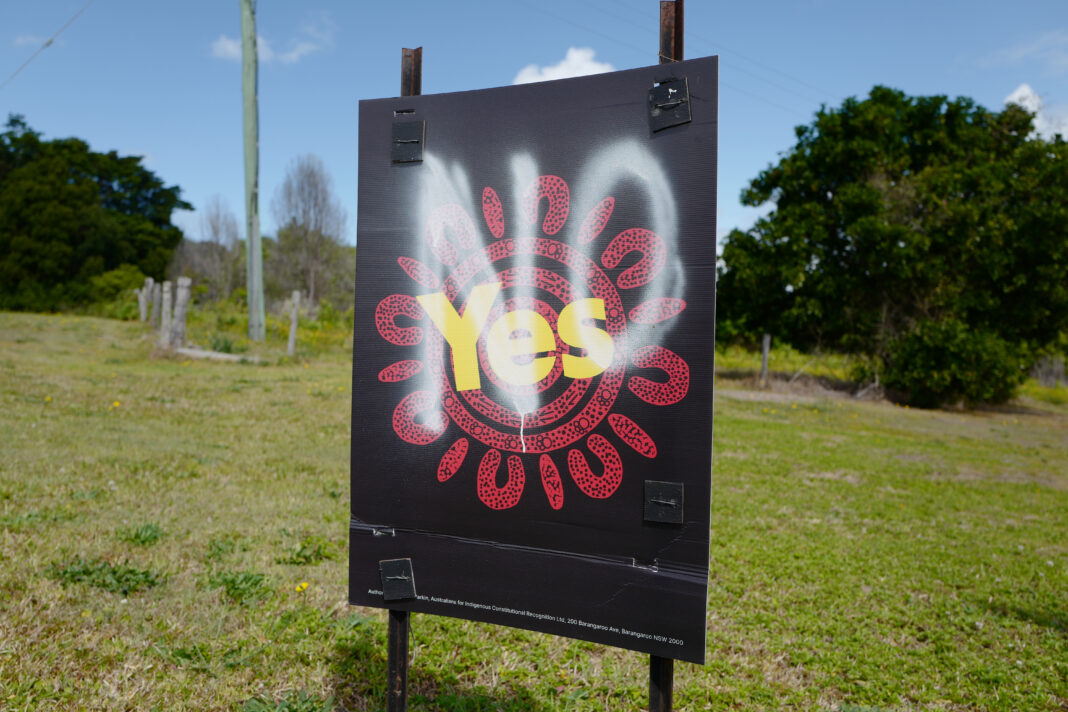Key figures of the Indigenous “progressive” opposition to the Voice to Parliament announced this week they would vote Yes in the upcoming referendum to alter the constitution. The moves reflect growing concerns among Indigenous leaders that a national No vote would fuel racist right-wing action and sentiment in the country and inadvertently align their cause with No campaigners like One Nation’s Pauline Hanson and Leader of the Opposition Peter Dutton. Progressive No activists, including First Nations Senator Lidia Thorpe’s Blak Sovereignty Movement, have opposed the Voice in favour of more concrete action and argued for a Treaty-first approach.
Thorpe is now one of the few in the movement who has stuck to this hardline stance. Her sister, co-campaigner on the Blak Sovereignty movement and Warriors of Aboriginal Resistance (War) co-founder Meriki Onus, publicly she would change her vote to Yes this week. Speaking with the Sydney Morning Herald, Onus while she agreed with much of the No position, she was now leaning towards voting Yes.
“We’ve seen an example in Australia where a body similar to the Voice to parliament already functions, and I think that they do really good work and there’s amazing opportunity there. So I would be leaning towards a Yes,” she said. WAR community organiser Tarneen Onus Browne has also changed their stance from No to Yes.
They told VICE they feared the “mental anguish” caused by a national No vote would harmfully impact Indigenous peoples, as well as lead to the rise of the far-right in Australia. “As a Black Queer, we went through the plebiscite and it was horrific. The most harmful consequence would be that our people are just absolutely disempowered,” they said.
“It will be a leg up for the ‘Racist No’ campaign and confirm that they can run a campaign based on misinformation and disinformation and win a national campaign, and the rise of the right wing in Australia. ” The Melbourne-based activist said they initially wanted a No because they feared their “sovereignty would be compromised”. “I felt like Blackfulla didn’t have a choice, and I knew this was happening to us and there was nothing we could do to change it.
I saw an opportunity to send messages of strength about First Nations people because we’ve seen a lot of deficit in the media,” they said. “I have ‘come out’ to support my mum and dad and my auntys and uncles who are voting Yes to this and the hundreds of Blackfullas I have spoken to on the phone over the last few months. ” With the referendum approaching on October 14, other Indigenous leaders have acquiesced to a Yes vote.
On Tuesday, Yorta Yorta rapper Briggs a No vote would “do nothing”. “I feel like it would set us back and does nothing to mend the already fragile and fragmented dialogue Australia already has with Indigenous people,” he told Guardian Australia. “Yes is the only way to maintain this idea that we’re still working towards a more unified country and society.
” Chief executive of Uprising of the People, Mililma May, the Sydney Morning Herald she had changed her vote to Yes after considering how a No vote would affect her community. “The idea of a No vote in the Northern Territory scared me in that it could mean a majority of Australians do not care about Aboriginal and Torres Strait Islander voices. And that fundamentally felt wrong to me,” she said.
“I realised that sovereignty can’t be impacted by voting Yes. And I think it’s healthy to have a level of mistrust of the government, but in a way that can make the government accountable. ” For Onus Browne, while a Yes vote isn’t a “silver bullet”, if the public were to vote Yes, “then a wave of transformative change for First Nations justice will follow”.
“Public momentum and demand give governments a political mandate to act on bold policy reform. This is far from ideal but it is happening, and a No vote will have devastating effects on Indigenous and non-Indigenous communities alike,” they said. “On their ballot papers, I ask settlers to write Yes to First Nations strength and leadership.
And if it is a Yes, Non-Aboriginal people must resist the complacency and the slumber that often happens after historic moments. “The fight is not over and the work is not done. I ask that your Yes be a commitment too, continuing to support our campaigns, standing alongside us for our fights for justice, and joining us on the streets at our protests, because Yes isn’t enough.
”.
From: vice
URL: https://www.vice.com/en/article/pkamvy/why-leaders-of-indigenous-progressive-no-campaign-switch-to-yes-vote-voice-to-parliament-referendum



